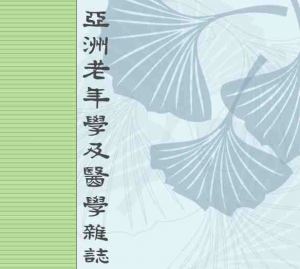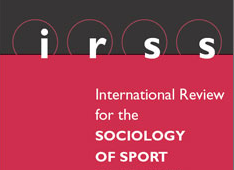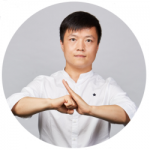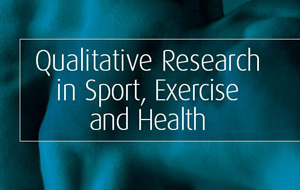Category: Research
Tai-Chi and Baduanjin during treatment and rehabilitation of older adults with COVID‑19
 Asian Journal of Gerontology and Geriatrics January 2021 15(2):96-96
Asian Journal of Gerontology and Geriatrics January 2021 15(2):96-96
by Siukan Law, Albert Wingnang Leung, Xu Chuanshan
In the COVID-19 outbreak, older adults have a higher infection rate because of their weak immune system. Tai-Chi and Baduanjin are common Qigong exercises that combined deep breathing and relaxation with flowing movements to improve respiratory muscles, whole-body movement, and mental rehabilitation.
(PDF) Tai-Chi and Baduanjin during treatment and rehabilitation of older adults with COVID‑19. Available HERE [accessed Apr 02 2021].
About the authors:
Siukan Law: Department of Science, School of Science and Technology, The Open University of Hong Kong, Ho Man Tin, Kowloon, Hong Kong
Albert Wingnang Leung: School of Graduate Studies, Lingnan University, Hong Kong
Chuanshan Xu: Key Laboratory of Molecular Target and Clinical Pharmacology, State Key Laboratory of Respiratory Disease, School of Pharmaceutical Sciences & Fifth Affiliated Hospital, Guangzhou Medical University, Guangzhou, China
Chinese martial arts and the Olympics: Analysing the policy of the International Wushu Federation
 International Review for the Sociology of Sport
International Review for the Sociology of Sport
(September 2020)
Qinsong Han, Marc Theeboom, Dong Zhu
Abstract
The International Wushu Federation (IWUF) has been striving to get wushu (Chinese martial arts) into the Olympics for over three decades. As these efforts have not been successful to date, a study was set up to identify and evaluate the IWUF’s underlying ‘Olympic policy’ assumptions. A theory-based evaluation approach was used which was based on data collected through 20 semi-structured interviews including senior IWUF officials, coaches, national federation officers and scholars. Findings suggest that the IWUF’s Olympic policy is characterised by a number of implementation and theory failures. Regarding the former is the unequal continental breakdown of board members, overrepresentation of Chinese nationals in specific positions and the use of mostly Chinese social media. And the latter, among other things, relates to simultaneously trying to enrich the cultural diversity of the Olympic programme by introducing a traditional Chinese sport, as well as detraditionalising the sport in an attempt to comply more with Olympic standards and facilitating comparison between performances. Results also showed that different perspectives exist among respondents with regard to China’s dominance in the Olympic policy of the IWUF. It is suggested to use specific policy analysis theories to further investigate this aspect.
 Qingsong Han is a joint doctoral student who studies at the research unit Sport & Society at the Vrije Universiteit Brussel and the Chinese Wushu College at the Shanghai University of Sport. He obtained his Master degree in Ethnic Traditional Sports at Henan University in China. In his doctoral research, he focuses on wushu internationalization policy by analyzing policy discourses and policy theory. Prof. dr. Marc Theeboom is the promotor of his research.
Qingsong Han is a joint doctoral student who studies at the research unit Sport & Society at the Vrije Universiteit Brussel and the Chinese Wushu College at the Shanghai University of Sport. He obtained his Master degree in Ethnic Traditional Sports at Henan University in China. In his doctoral research, he focuses on wushu internationalization policy by analyzing policy discourses and policy theory. Prof. dr. Marc Theeboom is the promotor of his research.
 Marc Theeboom holds a number of positions on the university and faculty level. He is member of the Bureau of the Research Council of the university, chair of the research committee of the Faculty of Physical Education and Physiotherapy. He is chair of the research group Sport & Society (SASO).
Marc Theeboom holds a number of positions on the university and faculty level. He is member of the Bureau of the Research Council of the university, chair of the research committee of the Faculty of Physical Education and Physiotherapy. He is chair of the research group Sport & Society (SASO).
His research primarily focuses on educational and policy-related aspects of (youth) sport in general and specific target groups in particular (e.g., socially deprived youth, ethnic minorities, elderly). He has a special interest in the analysis and evaluation of ‘sport development’ programmes in which sport is regarded as a social instrument and a means of community development (‘sport-plus’). A number of his research projects related to the analysis of specific aspects of a community sport stimulation programmes in various parts of Flanders. He is promoter of a number of doctoral studies with regard to the social value of sport.
Since the beginning of 2012, Marc is the promotor-coordinator of the Flemish Policy Research Centre for Sport including researchers from the Universities of Brussels, Ghent and Louvain. He has also become involved in collaborative work with a growing number of partners abroad (e.g., UK, the Netherlands, China, United States, UK, Finland, Norway, Australia). Contacts have also resulted in invitations to act as a chair, presenter or co-organiser during international meetings, conferences and working groups on the topic of sport and social integration.
To date, Marc Theeboom has authored and (co)authored more than 20 books (mostly in English or Dutch) and he has also an extensive number of peer reviewed articles, chapters in books or proceedings as well as presentations during international scientific meetings on this topic.
Shanghai University of Sport
Group-based Tai Chi as therapy for alleviating experiences of social death in people with advanced, incurable disease: an ethnographic study

Qualitative Research in Sport, Exercise and Health
(February 2021)
A Bradshaw, L Walker, E Borgstrom & S.M. Burke
Abstract
Advanced, incurable disease is a highly stressful and traumatic life event that can lead to losses of social identity, social connectedness, and losses associated with bodily disintegration. The combination of these losses makes it difficult to remain socially active and sometimes results in experiences of social death. However, few studies have explored the role of group-based hospice activities for mitigating the impact of social death in people with advanced, incurable disease. The aim of this study was to explore the personal and social experiences of participating in hospice-based Tai Chi among people with advanced, incurable disease, including its impact in mitigating experiences of social death. A focused ethnography was used to guide this study. Six months were spent in a local hospice day therapy unit in England collecting data through multiple methods, including 17 semi-structured interviews, 200 hours of participant observation, and informal conversations with 19 participants (15 females; 4 males, aged between 50 and 91). Data were analysed using a thematic framework approach and represented using traditional tales and ethnographic creative non-fictions (CNF). Two main themes were developed: (1) fostering social connections and meaningful support; and (2) the protection of a collective identity. An ethnographic CNF ‘moving and being together’ presents these themes in evocative, engaging, and accessible ways. Study findings demonstrate the value of group-based Tai Chi for mitigating experiences of social death in people with advanced, incurable disease. Ethnographic CNFs are a valuable way to represent lived experiences of illness in palliative and hospice care populations.
 A Bradshaw is a Research Fellow in Palliative Care within the Wolfson Research Palliative Care Research Centre at the University of Hull. His research focuses on understanding the role that physical activity may have on health, well-being, and quality of life in patients with advanced and chronic diseases. He also researches the implementation of person-centred outcome measures into routine palliative care practice and using data from these measures to drive service-wide improvements in palliative care. He has experience in using qualitative research methods and methodologies within health service research contexts.
A Bradshaw is a Research Fellow in Palliative Care within the Wolfson Research Palliative Care Research Centre at the University of Hull. His research focuses on understanding the role that physical activity may have on health, well-being, and quality of life in patients with advanced and chronic diseases. He also researches the implementation of person-centred outcome measures into routine palliative care practice and using data from these measures to drive service-wide improvements in palliative care. He has experience in using qualitative research methods and methodologies within health service research contexts.
 L Walker is Professor of Health and Social Work Research. She is a medical sociologist and registered social worker with expertise in the sociology of chronic and disabling conditions, particularly autoimmune conditions. She is an experienced qualitative researcher who has worked in both UK and southern African contexts. She is Associate Director of the Wolfson Centre for Palliative Care Research, University of Hull.
L Walker is Professor of Health and Social Work Research. She is a medical sociologist and registered social worker with expertise in the sociology of chronic and disabling conditions, particularly autoimmune conditions. She is an experienced qualitative researcher who has worked in both UK and southern African contexts. She is Associate Director of the Wolfson Centre for Palliative Care Research, University of Hull.
 E Borgstrom is a medical anthropologist and lecturer at the Open University. Her specialist area in research and teaching is death and dying, with an emphasis on end-of-life care. She uses anthropological skills to disrupt the normative concepts in end-of-life care by foregrounding people’s everyday experiences and the structural and discursive elements that shape how care is provided. She is a co-editor of Mortality, an international, interdisciplinary journal for death studies and plays an active role in the American Anthropological Association’s Dying and Bereavement special interest group, which is part of the Society for Medical Anthropology.
E Borgstrom is a medical anthropologist and lecturer at the Open University. Her specialist area in research and teaching is death and dying, with an emphasis on end-of-life care. She uses anthropological skills to disrupt the normative concepts in end-of-life care by foregrounding people’s everyday experiences and the structural and discursive elements that shape how care is provided. She is a co-editor of Mortality, an international, interdisciplinary journal for death studies and plays an active role in the American Anthropological Association’s Dying and Bereavement special interest group, which is part of the Society for Medical Anthropology.
 M. Burke is an Associate Professor in Exercise and Health Psychology in the School of Biomedical Sciences at the University of Leeds. Her research focuses on the role of physical activity for disease management and prevention, and the development and implementation of behaviour change interventions in clinical practice. She is particularly interested in active lifestyles for managing the adverse effects of cancer and improving quality of life for people nearing the end of life. She is also interested in the advancement of qualitative research methods within clinical and healthcare services research. She is an Associate Editor for the journal Research Quarterly for Exercise and Sport and an executive board member of the International Society of Qualitative Research in Sport and Exercise.
M. Burke is an Associate Professor in Exercise and Health Psychology in the School of Biomedical Sciences at the University of Leeds. Her research focuses on the role of physical activity for disease management and prevention, and the development and implementation of behaviour change interventions in clinical practice. She is particularly interested in active lifestyles for managing the adverse effects of cancer and improving quality of life for people nearing the end of life. She is also interested in the advancement of qualitative research methods within clinical and healthcare services research. She is an Associate Editor for the journal Research Quarterly for Exercise and Sport and an executive board member of the International Society of Qualitative Research in Sport and Exercise.
Effect of Tai Chi on depression symptoms and sleep quality among older adult women after exercise cessation
(January 2021)
Liang Cheng1,2, Li Qian1, Shuwan Chang1 & Benxiang He2
1 Sichuan Sport College: Chengdu, Sichuan, CN
2 Chengdu Sport University: Chengdu, CN
Abstract
This study investigated the effects of Tai Chi exercise on the psychological health and sleep quality of older adult women after exercise cessation. Nineteen Tai Chi practitioners and 20 controls completed the final tests. All participants completed the Profile of Mood States (POMS) and the Pittsburgh Sleep Quality Index (PSQI) at 0, 24 and 28 weeks (4 weeks after Tai Chi cessation). Compared with baseline, the fatigue, depression, total mood disturbance and PSQI scores in the Tai Chi group decreased at week 24 by 18.8%, 24.7%, 5.7% and 24.6%, and the vigour score increased by 18.3%. At week 28, depression and PSQI scores in the Tai Chi group decreased by 24.0% and 20.4%, respectively. Practicing Tai Chi for 24 weeks positively affected fatigue, depression, vigour and sleep quality among older adult women. The effect on reducing depression and improving sleep quality was sustained 4 weeks after Tai Chi was stopped.





